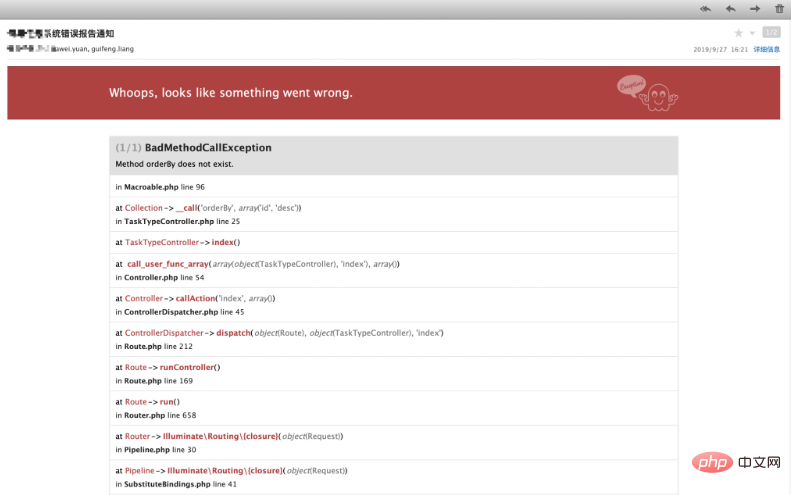

Foreword:
In daily development, we may write some bugs, but the project is already online , we cannot get feedback from customers immediately, so the email error reporting system comes in handy. We all know that laravel’s exception handling needs to be handled through the Handler.php file, so let’s start here
1. Determine whether you need to send an email in the report method. The code is as follows:
public function report(Exception $exception)
{
//判断是否需要发送邮件
if (config('mail.mailException.report')) {
$this->mailReport($exception, config('mail.mailException.toAccounts', []));
}
parent::report($exception);
}2. Define a method for sending emails. The code is as follows:
/**
* 邮件通知错误报告.
*
* @param $exception object 错误信息
* @param array $accounts array 收件人
*/
public function mailReport($exception, $accounts = [])
{
if (!empty($accounts)) {
try {
$e = FlattenException::create($exception);
$handler = new SymfonyExceptionHandler();
$html = $handler->getHtml($e);
$mail = new Mail();
$mail::to($accounts)->send(new ExceptionReport($html));
} catch (Exception $ex) {
}
}
}3. Create a new email exception class. , placed in the Mail folder under the App, named: ExceptionReport.php, the code is as follows:
<?php
namespace App\Mail;
use Illuminate\Bus\Queueable;
use Illuminate\Mail\Mailable;
use Illuminate\Queue\SerializesModels;
class ExceptionReport extends Mailable
{
use Queueable, SerializesModels;
/**
* Create a new message instance.
*/
public $subject = '错误报告通知'; //邮件标题
private $exception;
//通过构造函数实例化异常
public function __construct($exception)
{
$this->exception = $exception;
}
/**
* build一个异常发送模板
*
* @return $this
*/
public function build()
{
return $this->view('mail.exception')->with(['content' => $this->exception]);
}
}4. Create a new template view for exception sending, create a new mail folder under View, and create a file named : The view template file of exception.blade.php, the code is as follows:
{!! $content !!}5. Configure the person who needs to send emails and the switch of whether to send emails under config, add the following code at the end:
'mailException' => [
'report' => env('MailExceptionReport', 0),//是否邮件通知错误报告
'toAccounts' => [
'guifeng.liang@zun1.com',
]
] ,6. Configure the mailbox sending system information in the .env file. The format is as follows:
//邮件驱动 MAIL_DRIVER=smtp //邮件服务器 MAIL_HOST=smtp.exmail.qq.com //邮件端口 MAIL_PORT=465 //邮箱用户名 MAIL_USERNAME=1231231@qq.com //邮箱密码 MAIL_PASSWORD=dasdasdadasdad //加密方式 MAIL_ENCRYPTION=ssl //发件人邮箱 MAIL_FROM_ADDRESS=1476982312@qq.com //发件人姓名 MAIL_FROM_NAME=犯二青年 //是否发送邮件,发送为1,不发送为0 MailExceptionReport=1
7. That’s it. Test it. Just write some error reports, and then request the interface to see if it will work. Send an email to the email address you configured. The result is as follows:

The above is the detailed content of Laravel email push system exception. For more information, please follow other related articles on the PHP Chinese website!